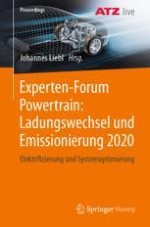2021 | OriginalPaper | Chapter
Model-based Development Methodology for HD Hydrogen Combustion System Optimization
Authors : Reza Rezaei, Christopher Hayduk, Marc Sens, Michael Riess, Alexander Fandakov, Christoph Bertram
Published in: Experten-Forum Powertrain: Ladungswechsel und Emissionierung 2020
Publisher: Springer Berlin Heidelberg
Activate our intelligent search to find suitable subject content or patents.
Select sections of text to find matching patents with Artificial Intelligence. powered by
Select sections of text to find additional relevant content using AI-assisted search. powered by
Hydrogen fuel, which can be produced from biomass or renewable power, like solar and wind, is regarded as one of the key energy solutions for CO2 reduction in the future transportation. The model-based development approach is widely used from early concept phase until detailed component design and finally in series development and virtual field-testing. In the concept phase, using model-based development can help to optimize both engine thermodynamics and hardware design. The hydrogen combustion system development, including charge motion and port design as well as optimization of air-fuel ratio considering fuel economy and exhaust after-treatment (EAT) system can be well performed using model-based approach.The focus of this paper is demonstration and discussion on model-based development approach for hydrogen combustion system optimization for heavy-duty commercial vehicle combustion engine. Starting from future emission regulation roadmap, the requirements on combustion system EAT and the NOx reduction are defined and used for engine and EAT development. The main advantage of the hydrogen fuel having the wide range of flammability and very high flame speed numbers compared to other fossil fuels, can be well used for better fuel efficiency and to reduce the NOx emissions. Potential of lean-burn hydrogen combustion for NOx reduction is shown and discussed using heavy-duty 2. L single-cylinder research engine with testing at multiple engine speeds and loads.As the next step, the 1D engine model is setup and calibrated for hydrogen combustion modeling. Heat transfer, combustion and emission model are developed and calibrated using single cylinder engine measurements.Using the validated 1D engine model, the potentials and challenges, as well as requirements on combustion and emissions for future HD engine concepts are defined and discussed. The obtained results from combustion system simulation are then used as input parameters for exhaust gas after-treatment system development. The effects of a lean hydrogen combustion, i.e. the lower exhaust gas temperature and their impact on exhaust gas after-treatment system efficiency to fulfill the future regulations are evaluated using numerical simulation. Based on the investigation results, recommendations on hydrogen combustion system for heavy-duty commercial vehicle applications and an outlook on future concepts are presented.
